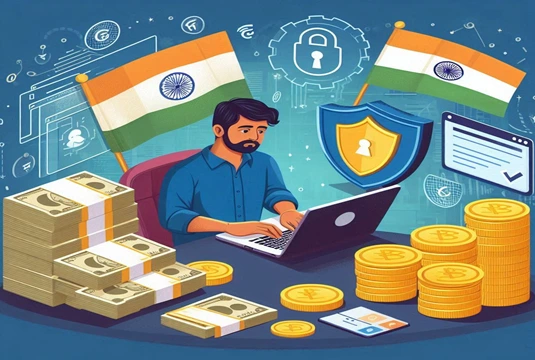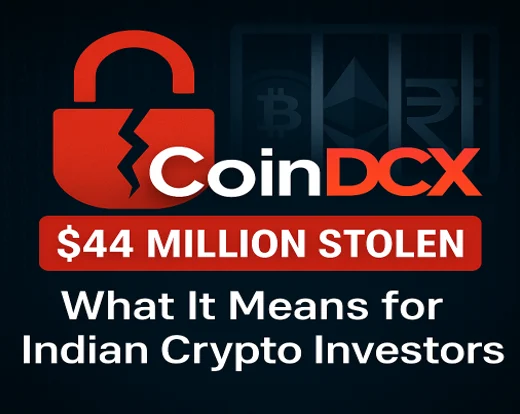
How Indians Can Safely Buy and Sell Cryptocurrencies

Cryptocurrency has revolutionized the financial landscape, offering a decentralized and transparent way to exchange value. In India the adoption of cryptocurrency has grown rapidly, with millions of investors entering the market. If you’re wondering how to buy and sell cryptocurrency in India, this guide will walk you through the process in detail.
Whether you’re a beginner or someone looking to refine your trading skills, this guide covers everything you need to know—from choosing a crypto exchange to understanding legal and tax implications. Let’s dive into it.
The Legal Landscape of Cryptocurrency in India
Before you begin trading, it’s crucial to understand the legal framework governing cryptocurrencies in India.
Cryptocurrencies like Bitcoin and Ethereum are not considered legal tender in India, meaning they cannot be used as an official mode of payment. However they are not banned. In 2020 the Supreme Court of India overturned the Reserve Bank of India’s (RBI) circular that restricted banks from offering services to crypto exchanges. Since then trading cryptocurrencies has been completely legal.
That said, the Indian government has imposed taxes on crypto transactions to ensure transparency:
Flat 30% tax on gains: Any profit made through cryptocurrency trading is taxed at 30%, irrespective of the income slab.
1% TDS on transactions: A 1% tax is deducted at the source for transactions above ₹50,000 annually (₹10,000 for non-business accounts).
Investors must adhere to these guidelines and maintain records of their trades for tax filing purposes.
Step-by-Step Guide to Buying Cryptocurrency in India
1. Choose a Reliable Crypto Exchange
The first step to buying cryptocurrency in India is selecting a reliable crypto exchange. Crypto exchanges are platforms where buyers and sellers trade cryptocurrencies. Several exchanges operate in India, offering features like fiat (INR) deposits, secure wallets, and user-friendly interfaces.
Some popular exchanges include:
Factors to consider when choosing an exchange:
Ease of Use: Beginners should opt for exchanges with simple interfaces.
Transaction Fees: Different exchanges have varying trading and withdrawal fees. Choose one with competitive pricing.
Security: Look for exchanges that offer features like 2FA (two-factor authentication) and cold wallet storage.
2. Create an Account and Complete KYC
To begin trading on an exchange, you must sign up and verify your identity. The Know Your Customer (KYC) process ensures compliance with Indian financial regulations.
Steps to complete KYC:
Register on the platform using your email and mobile number.
Upload government-issued ID (PAN card, Aadhaar, or Passport).
Link your bank account or UPI ID for transactions.
Once your KYC is verified, your account will be activated, and you can start trading.
3. Deposit INR to Your Exchange Account
After setting up your account, you’ll need to deposit Indian Rupees (INR) to purchase cryptocurrency. Most exchanges in India support multiple payment methods, including:
UPI (Unified Payments Interface): Fast and widely used.
Net Banking: Secure and reliable.
Credit/Debit Cards: Available on some exchanges but may have higher fees.
The deposited amount will reflect in your exchange wallet, ready for trading.
4. Buy Cryptocurrency
With funds in your account, you can now purchase cryptocurrency. Here’s how:
Browse the Marketplace: Explore the available cryptocurrencies like Bitcoin (BTC), Ethereum (ETH), and others. Start with popular coins to minimize risk.
Place an Order:
Market Order: Buy at the current market price.
Limit Order: Set a price at which you wish to buy, and the exchange will execute the trade when the market reaches that price.
Confirm the Transaction: Once the order is executed, the purchased cryptocurrency will appear in your exchange wallet.
Step-by-Step Guide to Selling Cryptocurrency in India
Selling cryptocurrency is just as simple as buying. Follow these steps:
1. Access Your Crypto Wallet
To sell your cryptocurrency, ensure that the coins you wish to sell are in your exchange wallet. If they are stored in an external wallet, transfer them to the exchange wallet before proceeding.
2. Place a Sell Order
Select the cryptocurrency you want to sell, choose the amount, and place a sell order. Similar to buying, you can opt for:
Market Order: Sell at the current market price.
Limit Order: Set a price at which you wish to sell, and the trade will be executed once the market reaches that level.
3. Withdraw INR to Your Bank Account
After successfully selling your cryptocurrency, the proceeds (INR) will reflect in your exchange wallet. You can then withdraw the amount to your linked bank account via UPI or bank transfer.
Safely Storing Your Cryptocurrencies
While exchanges provide wallets for storing your cryptocurrencies, it’s safer to transfer them to a personal wallet, especially for long-term holdings. Wallets can be categorized as:
Hot Wallets:
Connected to the internet and convenient for frequent transactions.
Examples: MetaMask, Trust Wallet.
Risk: Vulnerable to hacking.
Cold Wallets:
Offline storage solutions ideal for long-term holding.
Examples: Ledger Nano, Trezor.
Benefit: More secure against cyber threats.
Always back up your wallet’s private keys and never share them with anyone.
Taxation and Regulatory Compliance
The Indian government’s approach to cryptocurrency taxation requires traders to follow strict guidelines. Here’s what you need to know:
Flat 30% Tax on Gains: Profits from cryptocurrency trading are taxed at a fixed rate of 30%. No deductions (except the cost of acquisition) are allowed.
1% TDS: For every trade exceeding ₹50,000 (₹10,000 for individuals), 1% of the transaction value is deducted as TDS.
Record-Keeping: Maintain detailed records of your transactions for tax filing.
Failure to comply with these regulations can result in penalties.
Tips for Safe Trading
The crypto market is volatile, and risks are inherent. Follow these tips to minimize risks and trade safely:
Start Small: Begin with small investments and gradually increase as you gain experience.
Diversify Your Portfolio: Invest in a mix of cryptocurrencies to reduce risk.
Beware of Scams: Avoid offers promising guaranteed returns or shady platforms.
Do Your Research (DYOR): Before investing in a token, research its fundamentals, use case, and community support.
Enable Security Features: Use two-factor authentication (2FA) and strong passwords.
The Future of Cryptocurrency in India
India’s crypto ecosystem is evolving rapidly. The introduction of a Central Bank Digital Currency (CBDC) by the RBI signals that the government acknowledges the potential of blockchain technology. While challenges such as regulatory uncertainty and tax burdens remain, the growing interest in cryptocurrency indicates that India is on the path to becoming a significant player in the global crypto market.
Conclusion
Buying and selling cryptocurrency in India is now more accessible than ever, thanks to the rise of user-friendly exchanges and mobile apps. However, trading in cryptocurrencies requires careful planning, adherence to regulations, and awareness of risks. By following this guide, you can start your crypto journey confidently.
Remember, the cryptocurrency market is volatile, and prices can swing wildly. Always invest what you can afford to lose, diversify your holdings, and focus on long-term gains. With the right approach, cryptocurrency can be a valuable addition to your financial portfolio.
Disclaimer
The information provided in this article is for educational and informational purposes only and should not be considered as financial or investment advice. Cryptocurrency investments are subject to high market risks, and past performance does not guarantee future results. Always do your own research (DYOR) and consult a financial advisor before making any investment decisions. Additionally, ensure compliance with Indian tax laws and regulations when trading cryptocurrencies.







